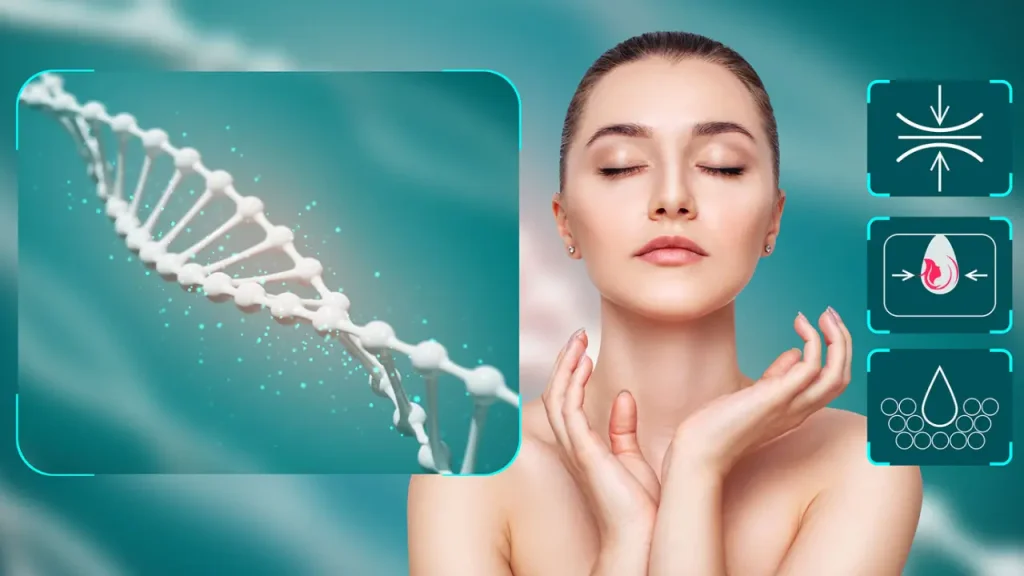The backbone of this innovative approach to skincare is DNA analysis – the exploration of your genetic blueprint, dictating everything about you, including your skin. We’re delving into genes linked to skin health and appearance such as hydration, elasticity, inflammation and antioxidant production. It turns out that our genetic variations can significantly shape how our skin responds to different treatments and environmental stressors, even determining how fast it ages.
Step into the Future: How to Get Your DNA-based Skincare Regimen
Wondering how to get started on this fascinating journey of DNA-based skincare? It’s simpler than you think, and it starts with picking a reputable company that offers DNA analysis for skin care. Your chosen company should value your privacy and have a solid understanding of the complex relationship between genetics and skin health.
Next, you’ll need to provide a DNA sample, typically through a quick and painless cheek swab. This swab will collect cells that are then sent back for analysis. Scientists decode your DNA, identifying markers linked to traits like sun sensitivity, dryness, elasticity, pigmentation, and oxidative stress.
Using this information, a skincare regimen is designed specifically for you. But remember, even though this is a revolutionary approach, it’s not a stand-alone solution. Healthy lifestyle choices, regular dermatologist visits, and adjustments based on changing environments and skin conditions are crucial to this personalised skincare equation.
DNA-based Skincare: Pros, Cons, & Clinics Worth Checking Out
Embracing DNA-based skincare comes with both positives and negatives. On the upside, you’ll get skincare products tailored to your genetic makeup, a proactive approach to skincare, long-term efficacy, and a prevention-oriented strategy that could save future skincare costs. However, the initial investment might be steep, and sharing intimate genetic information raises privacy concerns. Plus, our understanding of the genetic landscape is still evolving.
For those ready to embark on this journey, Adntro and EasyDNA UK are reputable options worth considering.
Transitioning to DNA-based Skincare: A Smooth Changeover

Alongside professionally recommended products, consider DIY alternatives based on your genetic insights. Maintain a holistic approach by making appropriate lifestyle modifications in alignment with your DNA-based skincare regimen.
The future of DNA-based skincare is pulsating with promise. Advancements in biotechnology could potentially blend genetic analysis with emerging technologies like artificial intelligence for advanced data analysis. A significant leap forward could be the integration of microbiome analysis to understand the unique microbial environment of one’s skin, delivering a comprehensive skincare solution. As we advance, DNA-based skincare is likely to evolve from being a novelty to becoming a beauty industry staple.
DNA Skin Analysis Features
- Personalized Skincare Recommendations: DNA skin analysis provides personalized skincare recommendations tailored to an individual’s unique genetic makeup. By analyzing specific genes related to skin health, the analysis can identify potential areas of concern and suggest targeted solutions for optimal skincare results.
- Identification of Genetic Predispositions: DNA analysis can reveal genetic predispositions to specific skin conditions such as premature ageing, sensitivity, hyperpigmentation, or collagen breakdown. Understanding these predispositions allows individuals to take proactive measures to prevent or minimize the effects of these conditions.
- Customized Anti-Aging Strategies: DNA skin analysis can identify genetic markers associated with the ageing process. This information helps to develop personalized anti-ageing strategies by recommending specific ingredients or treatments that target individual genetic variations, promoting healthier and more youthful-looking skin.
- Optimal Ingredient Selection: With DNA skin analysis, individuals can gain insights into their genetic response to certain skincare ingredients. This information assists in selecting products with ingredients that are compatible with their genetic profile, improving the efficacy and safety of their skincare regimen.
- Prevention and Early Intervention: By identifying genetic predispositions to skin concerns, DNA skin analysis allows for proactive prevention and early intervention. It enables individuals to adopt preventive measures and choose suitable products and treatments to address potential issues before they become more pronounced.
- Enhanced Skincare Routine: DNA analysis provides a comprehensive understanding of an individual’s skin needs, enabling them to fine-tune their skincare routine. It helps individuals identify the most effective cleansers, moisturizers, serums, and treatments for their specific genetic profile, leading to more targeted and results-driven skincare.
- Long-Term Skin Health: DNA skin analysis offers insights into an individual’s genetic strengths and weaknesses related to skin health. Armed with this knowledge, individuals can make informed decisions about their skincare, focusing on long-term skin health and taking preventive measures to maintain youthful, radiant skin.
Remember, DNA skin analysis should be performed by qualified professionals or reputable laboratories. It’s important to consult with skincare experts and dermatologists to interpret the results and translate them into a customized and effective skincare routine tailored to your unique genetic profile.
The Beauty Industry Reimagined
DNA analysis in skincare is transforming the beauty industry landscape. While it’s still in the early stages and comes with challenges like cost and privacy concerns, the advantages and future potentials confirm its ground-breaking potential. Beauty, after all, is more than skin deep, and now, our skincare can be too! So, are you ready to revolutionise your skincare regimen?


